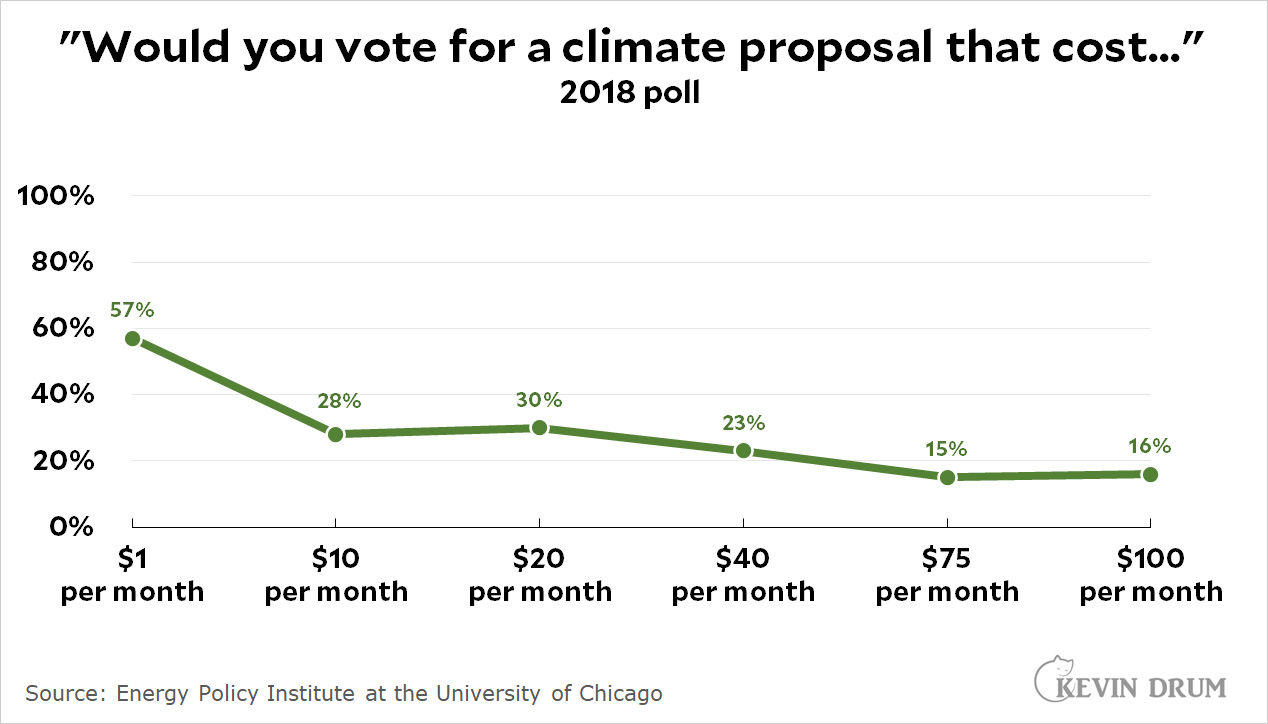Last night was dex night, so I spent some time hanging around Twitter. At one point I ended up writing something that I've hinted around at here but have never quite come out and said outright. So let's take care of that.
I've been watching the climate change fight for 20 years now, waiting and waiting for evidence that the public takes it seriously enough to do something about it. Not just say it's important when a pollster calls, but demonstrate a real-world willingness to make lifestyle sacrifices that would make a difference. By chance, Paul Krugman wrote about this today:
It has long been painfully obvious that voters are reluctant to accept even small short-run costs in the interest of averting long-run disaster. This is depressing, but it’s a fact of life, one that no amount of haranguing seems likely to change.... Emission taxes are the Econ 101 solution to pollution, but realistically they just aren’t going to happen in America.
 Needless to say, I agree with Krugman. Two years ago I wrote a long piece for Mother Jones based on exactly this observation, and I'd add that it's true of other countries as well. Neither Chinese nor Indian voters have any interest in freezing or lowering their standard of living at a quarter of our level just because we happened to get rich first. And it's hard to blame them. Nevertheless, it just adds to the mountain of evidence—which I outlined in my article—that the public simply can't be counted on to support any serious action.
Needless to say, I agree with Krugman. Two years ago I wrote a long piece for Mother Jones based on exactly this observation, and I'd add that it's true of other countries as well. Neither Chinese nor Indian voters have any interest in freezing or lowering their standard of living at a quarter of our level just because we happened to get rich first. And it's hard to blame them. Nevertheless, it just adds to the mountain of evidence—which I outlined in my article—that the public simply can't be counted on to support any serious action.
Not in time, anyway. A decade ago I wrote in Democracy that by 2024:
The fact of climate change will become undeniable. The effects of global warming, discernible today mostly in scary charts and mathematical models, will start to become obvious enough in the real world that even the rightest of right wingers will be forced to acknowledge what’s happening.
I was only half right. The effects of climate change are becoming undeniable, but it hasn't made even a lick of difference. The Republican Party remains unanimously opposed to clean energy because they oppose anything that raises the possibility of corporate regulation. This is very unlikely to change by 2024.

At the time I wrote about all this two years ago, my conclusion was that we needed massive funding of R&D in hopes of finding a miracle technology that would fix our climate problem. Even then I acknowledged that this was a long shot, but at least it was better than nothing.
But the truth is that I always believed it was a real long shot. When you combine the slim possibility of getting the needed funding with the slim possibility of someone inventing a breakthrough, the odds of success are very small. I'd put it at 10%. Maybe 5%.
This leaves us with only one possible solution: geoengineering. This has pros and cons. The main upside is that the most likely version of geoengineering involves seeding the stratosphere with sulfur aerosols. This blocks sunlight and reduces the temperature, in the same way that eruptions of sulfur from large volcanoes do this on a temporary basis (usually a year or two). We pretty much know it would work, and we also know that it's cheap. Current estimates suggest $10 billion per year, but even if that's off by a factor of ten, it's still chicken feed.
The downside is that everyone hates it. Scientists hate it because it's potentially dangerous—and we have no idea how dangerous. Conservatives hate it because it would force them to acknowledge climate change as an actual problem. And liberals hate it because they believe it would reduce support for more conventional solutions (solar and wind buildouts, better insulation, etc.).
But we're running out of time, and we have to acknowledge that before long we may have no choice but to start cooling the planet by force majeure. This means we need to start up massive research projects on a  few of the most promising approaches to geoengineering so that a decade from now we know a lot more about how likely they are to work, how best to implement them, and what risks we'd be taking if we did.
few of the most promising approaches to geoengineering so that a decade from now we know a lot more about how likely they are to work, how best to implement them, and what risks we'd be taking if we did.
But by "massive" I'm not talking about the $700 billion I suggested for a sweeping R&D program. I'm talking about a few billion per year. That's nothing.
And it doesn't bind us to anything. It just gives us options. No harm is done if a decade from now we're making real progress and it looks like maybe we can hit zero carbon emissions by the middle of the century. We just keep the research quietly humming along in case we ever need it.
Needless to say, we should continue pushing solar and wind and nuclear and anything else that will reduce our carbon emissions. Maybe it will work! But even if it doesn't, it will make a big difference. And one thing's for sure: if we end up bombing the stratosphere with sulfur, the less the better. If conventional methods get us 50% of the way to carbon neutrality, that means 50% less sulfur to close the rest of the gap. These solutions don't conflict, they complement each other.

I wonder if the irony of promoting the idea of deliberately dumping/releasing a substance into the atmosphere we spent decades trying to avoid dumping into the atmosphere in the name of combating acid rain is noticed by Kevin?
I assume altitude makes all the difference, but still, the SO2 has to end-up somewhere, yes? Or is this indeed a case of what goes up does not come down?
It comes down but the atmospheric concentration is dilute relative to what we used to pump out in fossil fuels. Having it in the stratosphere mitigates most of the negative effects.
What Kevin seems to miss is that this sort of techno-fix still requires a proper and complete accounting of our CO2 budget. Otherwise it allows the underlying problem to keep getting worse. It is a little like a person trying to maintain (or even enhance) an extravagant lifestyle by progressively borrowing money. Unless the person's budget is approaching a balance, his financial "system" is clearly headed for bankruptcy. Under present lack of global carbon accountability, geoengineering (aka, intentional atmospheric pollution) will only promote our continuing extravagance and postpone the reckoning,. Bankruptcy of the global climate system is a frightening prospect, and we must expect the end result to be utterly brutal to global civilization.
Not a popular opinion in these parts, but with Republicans being the party of rural people they have a natural constituency that opposes many climate things liberals want. A lot of the preferred liberal climate things just don't work for many rural people, and/or are so costly that rural folks just don't have the money to do them. You're not hauling hay wagons all day long with electric trucks, or running a combine, or changing your heating system overnight to an expensive heat pump. It's not just knee-jerk opposition, but a lot of people just don't have the money to do these things, rural or urban. IMHO liberals need to focus on the things that many people can agree on, like building solar and wind and other renewables. I see lots of solar and wind installations in very rural areas.
Looks more and more like the _Termination Shock_ solution is exactly how this will play out...
Yes, Neal Stephenson's recent novel "Termination Shock" has a nice scheme for doing exactly this. It involves building enormous guns in the Southwest that shoot shells up into the stratosphere to release SO2, and then come down on parachutes to be reused. It's built by a Texas billionaire who calculates that the whole cost could be absorbed by protecting the real estate values of just Houston. Other low-lying countries soon take an interest, as does Indian and Chinese intelligence.
Like Kevin, Stephenson is sick of inaction on this. Decades of stagnation in space tech, for example, have shown that governments can't do innovation. The competing forces on governments ensure that nothing happens, with the notable exception of wars. It's really all large institutions - car companies couldn't even get the obvious tech of EVs going. So Stephenson proposes that oligarchs take over climate action, just as they have with space, EVs, and now even fusion. That's depressing and anti-democratic, but here we are.
We might be able to do Air Carbon Capture and Sequestration with cheap enough carbon-neutral electricity, so there's that as well.
Calcium Carbonate might actually be better than sulfur aerosols. More cooling per ton sprayed into the sky, and unlike sulfur aerosols it won't screw up the rainfall or cause ozone damage (it would actually build up the ozone layer).